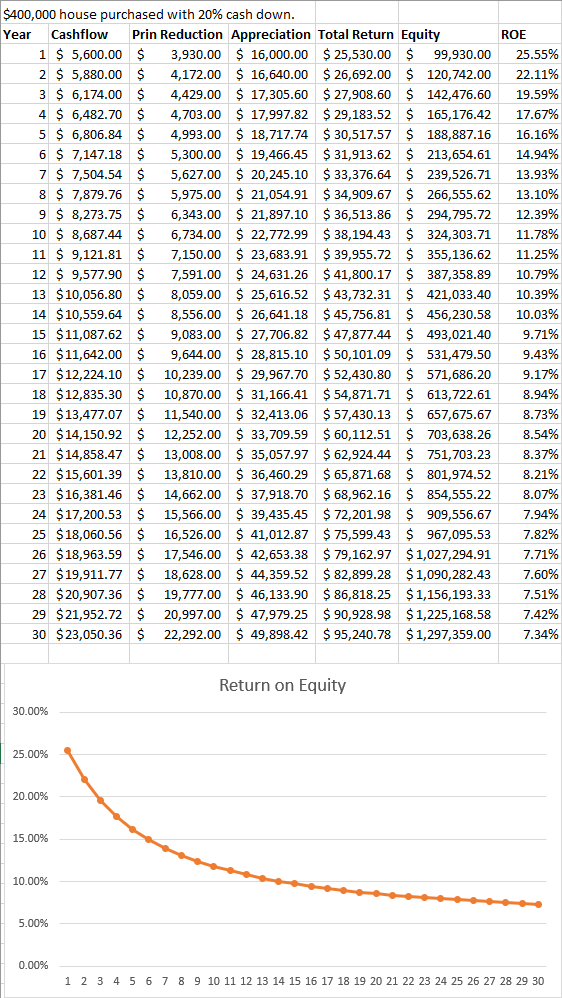Your real estate investments and income from them will pay you for the rest of your life and your children’s lives and on and on. However, life and investments change over time, and below are some reasons why you may want to, or that it is, the right time to sell an investment property.
- You need to convert the equity into cash to pay for a large unexpected expense. Life happens.
- The property’s expenses are greater than anticipated and it’s producing negative cashflow. Bad investment.
- You inherited the rental property and don’t understand the returns and value of investment real estate and have no interest in being a landlord.
- You could take the equity in the home and get better returns with a different kind of investment.
In this article I’m going to focus on #4 as a savvy investor would measure their returns and compare them to the returns of other available investments.
I Sold Our First House
Back in 2018 I sold the only piece of real estate I’ve ever sold – our first home. It was a rental property at the time, and the worst performing piece of investment real estate in our portfolio, especially from a cashflow standpoint. I was buying a technology business at the time and needed cash to help cover the down payment, so I sold the worst performing investment property in our portfolio. Before making this decision, alternatively I looked into refinancing a couple other rentals, but they didn’t have enough equity in them to get the dollars needed as the bank will only lend up to 75% loan to value (LTV) on investment property. Selling this rental property gave us cash up to 100% of the property value, then minus the mortgage loan, capital gains, and realtor and transaction fees. It would have been nostalgic to say we still owned our first home after 50 years, but it was the right thing to do. Of course the market went way up in the few years following 2019-2022 and I missed out on another 80K of gains, but it all worked out ( see my story on how I tripled a tech company in three years ).
How Real Estate Pays You
I’ll write a different and more detailed article on each of these in the future, but for the purposes of determining when to sell an investment property, this will be brief. Investment property pays you four ways:
Cashflow – The amount of cash going into your pocket after debt service (mortgage), insurance, taxes, and all other expenses.
Mortgage Principle Reduction – Your tenants essentially pay off the loan for you each month as you take their rent and make a loan payment. Some of this payment will go towards interest for the bank and some will benefit you by reducing the principle balance on the loan. The amount of principle paid each month varies depending on where the loan is in the amortization schedule.
Appreciation – Properties generally increase in value naturally from inflation and may increase further if there is more demand for your property or if you made improvements. A property that was worth $400,000 and is later worth $450,000 appreciated by $50,000.
Tax Shelter – The government not only allows us to write off all property related expenses including mortgage interest, but you can write off a percentage of the value of the house over 27.5 years. This is called depreciation, and I’ll cover this more later. For example, your investment property that had a $400,000 house on it when you bought it will depreciate $14,545 ($400,000 / 27.5) each year, and you can write this amount off in addition to all other expenses.
Return on Equity
Since real estate pays you four ways, it takes a little effort to figure out the returns and they’re not as obviously as earning a return on a savings account or stocks. The return on equity calculation gives you the answer to “if I sold my property and took all the cash and invested in something else, would it produce a better return?”
As you own the investment property for years, over time you’ll notice:
- Cashflow increases as rents increase and the mortgage payment stays the same.
- Loan balance is less than before.
- The property is worth more than it used to be.
Example Property
Let’s look at an example. You purchase a property for $400,000 and financed it with a 30 year fixed rate mortgage at 6% interest and put $80,000 (20%) down.

Over time the cashflow, principle reduction, and appreciation gets better every year. This is great right!? Well, yes it is, but we need to ask the question:
If I sell this investment property today and put the cash into a different investment, could I get a better return?
What alternative investments do you have to consider? Stock market S&P is usually in the 8% range. Maybe you put it in a REIT like Fundrise that has a return in the 15% range. Real estate has the best returns so what I recommend is one of two things:
- Sell and purchase a new larger property using a 1031 exchange
- Get a second mortgage on the property and use the cash to help buy another investment property.
Continually upgrading your real estate properties and increasing the size of your portfolio is powerful! It’s the equivalent of compound interest, just done with real estate. Yes there is some cost to selling and refinancing, so extracting and using your equity every 5-8 years is the sweet spot.
What about Real Estate’s tax benefits?
Great question, they weren’t considered here as return on equity only considers 3 of the 4 ways real estate pays you. So, even when you discover after 22 years that your real estate ROE is only 8% and matches the stock market, keep in mind how the return is taxed. The income from the stock market will be taxed as ordinary or “qualified” income, so probably in the 15 – 40% range considering both federal and state taxes depending on your tax bracket and state income tax rates. If you pocket the same amount of cash from your real estate investment, and you’ve done all the right things like get a loan on the property, you’ll pay little to no tax, because income from real estate is “passive” and taxed at a lower rate, and expenses including depreciation (tax shelter) will reduce this income from a tax standpoint. A general example, and this varies by tax brackets and many other factors – if you earned $20,000 from each investment, you’d pay $7,000 in taxes if it were stocks, or $2,000, and possibly $0, if it were real estate.


